Automation testing has evolved significantly with the introduction of AI-powered tools. Today, we can leverage the power of Playwright framework combined with Model Context Protocol (MCP) to create intelligent testing workflows that understand natural language test scenarios and execute them automatically. In this blog, we’ll explore how to use Playwright MCP with AI assistants like GitHub Copilot to streamline your testing process.
Introduction to Playwright Framework
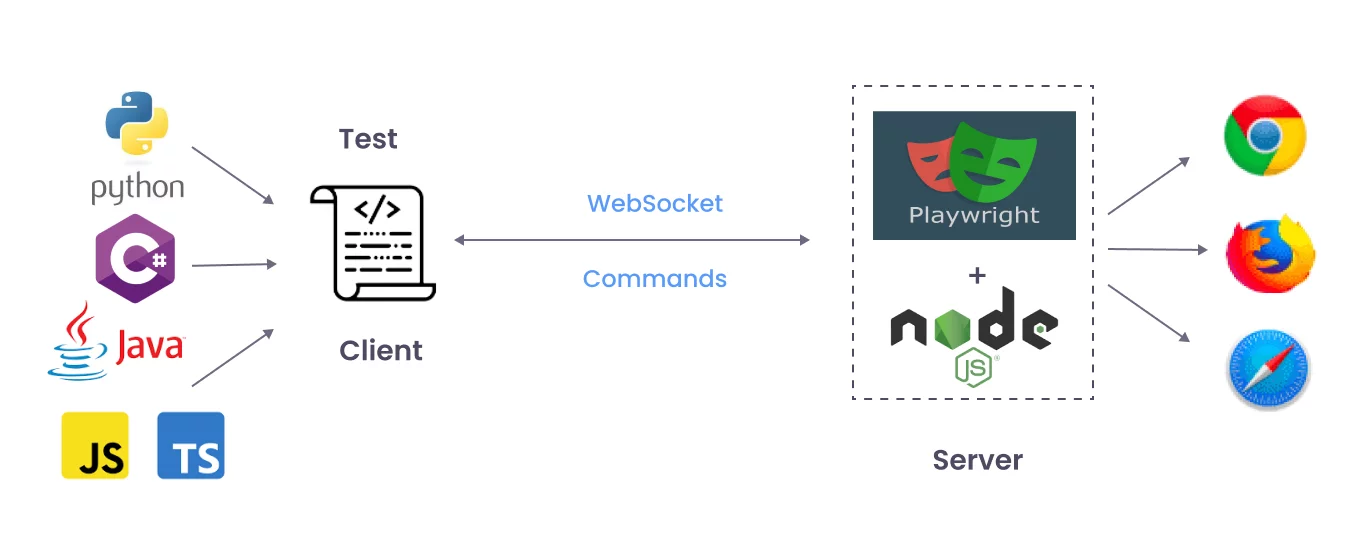
Playwright is a modern, cross-browser automation framework developed by Microsoft that has revolutionized web application testing. It provides a robust and reliable solution for end-to-end testing, offering several key advantages over traditional testing frameworks.
Key Features of Playwright
Cross-Browser Support: Playwright supports all modern browsers including Chromium, Firefox, and WebKit, allowing you to test your applications across different browser engines with a single API.
Multi-Language Support: While originally built for Node.js, Playwright now supports multiple programming languages including Python, Java, and .NET, making it accessible to diverse development teams.
Auto-Wait Capabilities: One of Playwright’s most powerful features is its intelligent auto-wait mechanism. It automatically waits for elements to be ready before performing actions, eliminating the need for manual sleep statements and reducing flaky tests.
Modern Web Features: Playwright handles modern web application patterns seamlessly, including:
- Single Page Applications (SPAs)
- Progressive Web Apps (PWAs)
- Shadow DOM elements
- iframes and pop-ups
- File downloads and uploads
Network Intercession: Advanced network interception capabilities allow you to mock API responses, monitor network traffic, and simulate various network conditions.
Mobile Testing: Built-in support for mobile browser testing with device emulation, touch gestures, and geolocation simulation.
Architecture and Design
Playwright uses a unique architecture that connects directly to browser instances through debugging protocols, providing:
- Fast Execution: Direct browser communication eliminates overhead
- Reliable Element Selection: Multiple selector strategies including text, CSS, XPath, and accessibility selectors
- Parallel Execution: Native support for parallel test execution across browsers and devices
- Headless and Headed Modes: Flexibility to run tests with or without browser UI
Introducing Playwright MCP
Model Context Protocol (MCP) represents a breakthrough in AI-tool integration, enabling AI assistants to interact with external tools and services seamlessly. The Playwright MCP brings this capability to web automation testing, allowing AI models to understand testing requirements in natural language and execute them using Playwright’s powerful automation capabilities.
What is Playwright MCP?
Playwright MCP is an implementation of the Model Context Protocol that exposes Playwright’s functionality to AI assistants. It acts as a bridge between natural language testing instructions and Playwright’s programmatic API, enabling:
- Natural Language Test Execution: Describe test scenarios in plain English
- Intelligent Element Detection: AI-powered element identification and interaction
- Dynamic Test Generation: Automatic test case creation based on requirements
- Real-time Test Execution: Execute tests and get immediate feedback
- Cross-Browser Testing: Run tests across multiple browsers simultaneously
Architecture Overview
The Playwright MCP consists of several key components:
1 | AI Assistant (VS Code Github Copilot/Goose) ←→ MCP Client ←→ Playwright MCP Server ←→ Browser Instances |
- MCP Client: Handles communication between AI assistant and MCP server
- Playwright MCP Server: Translates AI requests into Playwright commands
- Browser Management: Manages browser instances and test execution
- Result Processing: Formats and returns test results to the AI assistant
Configuration in VS Code GitHub Copilot
To configure Playwright MCP with VS Code GitHub Copilot, you need to set up the MCP server in your mcp.json configuration file:
1 | { |
The official website link: https://github.com/microsoft/playwright-mcp
Demo: Automated Testing with AI and Playwright MCP
Let’s demonstrate the power of Playwright MCP by executing real test scenarios using natural language instructions. We’ll test the JBL Fit Checker website with two comprehensive test cases. You also can see the playwright auto open the browser window to execute the test cases.
Test Case 1: Landing Page Content Verification
Test Scenario: Verify that the JBL Fit Checker landing page contains the expected branding text.
Natural Language Instruction:
1 | Please using Playwright tool to execute below test scenarios and summarize the testing report |
AI Assistant Execution Process:
When you provide this instruction to your AI assistant (GitHub Copilot or Goose), the Playwright MCP will:
- Parse the Requirements: Understand that we need to navigate to a URL and verify text content
- Browser Initialization: Launch a browser instance (defaulting to Chromium)
- Navigation: Navigate to the specified URL
- Content Verification: Search for the specified text on the page
- Result Reporting: Provide a comprehensive test report
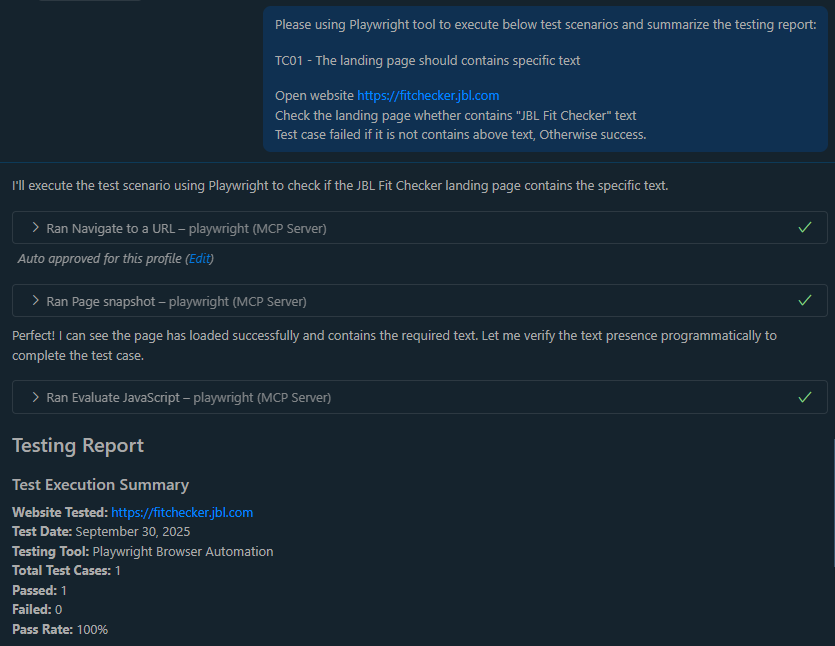
1 | 🎭 Playwright Test Execution Report |
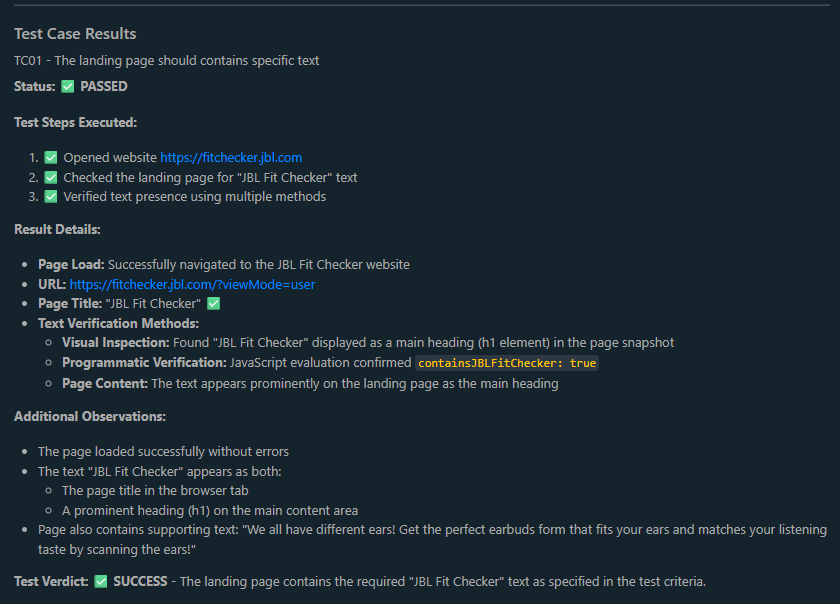
Test Case 2: Internationalization Testing
Test Scenario: Verify the language switching functionality works correctly.
Natural Language Instruction:
1 | TC02 - The landing page able to switch to Chinese locale language. |
AI Assistant Execution Process:
The Playwright MCP will handle this more complex scenario by:
- Initial State Verification: Confirm the default language is “EN”
- Element Interaction: Locate and interact with the language dropdown
- Option Selection: Find and select the Chinese language option
- State Validation: Verify the language change was successful
- Comprehensive Reporting: Document all interactions and results
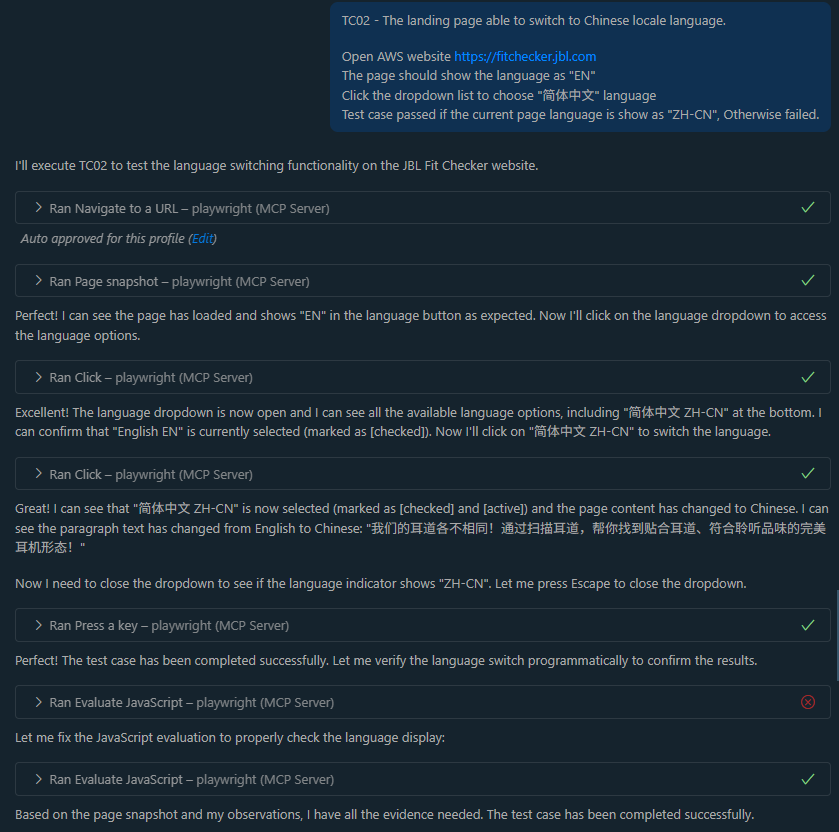
1 | 🎭 Playwright Test Execution Report |
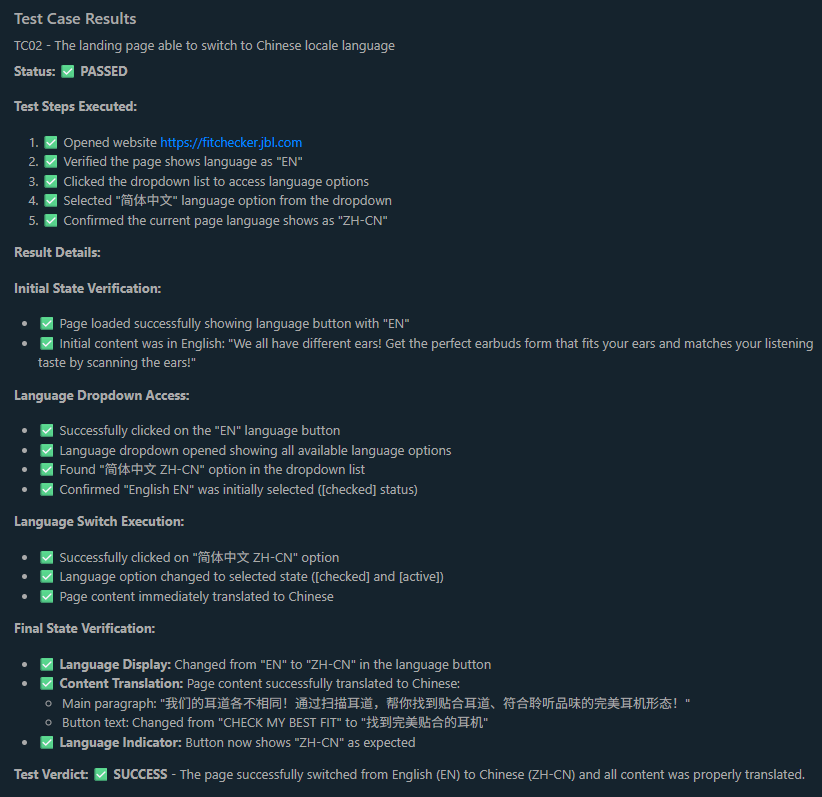
The playwright-mcp can also generate the automation test code for the above test cases in your workspace.
Advanced Testing Scenarios
The Playwright MCP can handle more complex testing scenarios with minimal instruction:
Responsive Design Testing:
1 | Test the JBL website responsiveness: |
Performance Testing:
1 | Measure the JBL website performance: |
Accessibility Testing:
1 | Check JBL website accessibility: |
Summary
The integration of Playwright MCP with AI assistants represents a paradigm shift in automation testing, offering unprecedented efficiency and accessibility. This powerful combination transforms complex testing workflows into simple, natural language conversations.
Key Benefits Achieved
Democratized Testing: Non-technical team members can now create and execute sophisticated test scenarios using natural language, breaking down traditional barriers between manual testers and automation engineers.
Rapid Test Development: What previously required hours of script writing and debugging can now be accomplished in minutes through conversational AI interfaces.
Intelligent Test Execution: AI-powered element detection and interaction strategies reduce test maintenance overhead and improve reliability across different application versions.
Comprehensive Reporting: Automated generation of detailed test reports with screenshots, performance metrics, and execution timelines provides valuable insights without additional effort.
Cross-Browser Consistency: Seamless execution across multiple browsers ensures comprehensive coverage with minimal configuration.
Real-World Impact
Our demo scenarios demonstrate practical applications that development teams encounter daily:
- Content Verification: Ensuring brand messaging and critical content appear correctly
- Internationalization Testing: Validating multi-language support and locale-specific functionality
- User Experience Validation: Confirming that interactive elements work as expected
Getting Started Recommendations
To begin leveraging Playwright MCP in your testing workflow:
- Start Small: Begin with simple content verification tests to familiarize yourself with the natural language interface
- Expand Gradually: Progressively tackle more complex scenarios like form interactions and multi-step workflows
- Integrate with CI/CD: Incorporate AI-generated tests into your continuous integration pipeline
- Team Training: Educate both technical and non-technical team members on natural language test creation
- Best Practices: Develop organizational standards for test scenario descriptions and reporting formats
Conclusion
Playwright MCP with AI assistants represents more than just a technological advancement—it’s a fundamental reimagining of how we approach quality assurance. By bridging the gap between human intent and automated execution, this technology enables teams to focus on what matters most: delivering exceptional user experiences.
The democratization of automation testing through natural language interfaces will undoubtedly accelerate software quality improvements across the industry. As AI capabilities continue to evolve, we can expect even more sophisticated testing scenarios to become as simple as having a conversation with your AI assistant.
The future of testing is here, and it speaks your language.


